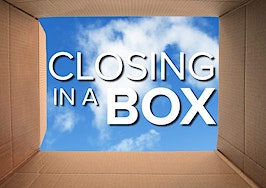Lately, I have lamented the fact that the real estate industry craves more leadership.
Then, out of the blue, Trulia founder Pete Flint re-enters the real estate stratosphere, announcing on Facebook, “After thinking about homelessness for 10-plus years but not having the bandwidth to help, I’m delighted to join @NewStoryCharity as an adviser.”
New Story crowdsources funds to find and build homes for the homeless. The project has funded 117 families around the globe.
Like Kickstarter, you pick a family you want to help and make a donation. The goal is to raise $6,000 for each family who works with a local partner to build a house. They not only get a house, but they become homeowners.
An example: After five difficult years of being homeless, Ornil, her husband, and her five children now live in a concrete block home in Leveque, Haiti. They moved into their new house on March of this year. Crowdfunded through New Story, the house was built by Mission of Hope.
Big shoutout for Flint! A true industry leader.
The other side of the coin
Out and about, meeting with folks all over the country, I have been on this informal quest to figure out who leads and who doesn’t. I had a few meetings over the last month in which some off-handed remarks stuck in my craw.
Meeting One: A high-level executive said to me that agents “cannot be successful unless they are good-looking.” Really?
Inman reporter Paul Hagey will file a story shortly about this seemingly empty-headed observation and found a report that confirmed the truth of what I heard.
More attractive agents earn more money, according to a 2012 academic economics analysis. Researchers studied agents’ attractiveness by showing survey respondents headshots of agents and asking them to rate them on “physical attractiveness or beauty” on a scale of 1 to 10. On average, more attractive agents do fewer deals than their less-attractive counterparts, but each transaction is worth much more, the study showed.
OK.
Meeting Two: A successful big broker and I were discussing off-market listings, both agreeing it was bad for the consumer and the industry and could harm the sanctity of the MLS. I asked him what he was doing about it. He shrugged: “Nothing.”
This is like not going to the doctor when you know treatment could help you survive a debilitating health condition.
I wish the industry would confront the growing number of off-market listings. I heard that 60 percent of listings in Beverly Hills are off-market. Not good for anyone. A functioning and successful marketplace is being chipped away at by greedy agents and brokers.
Meeting Three: A big broker and I were discussing what the industry needed to do to innovate. The discussion circled back to his fears about customer and listing data protection and about how NAR should innovate — not the brokers because “we have no R&D departments.” I asked why not?
Long pause. Still waiting …
Meeting Four: I was meeting with a highly regarded broker, chatting about the portals, and he lit up when discussing the early days of realtor.com (Homestore). “I made $1 million off that deal,” said the broker with a proud smile. Back in the late 1990s, Homestore went around the country giving big influential brokers cheap stock options so it could do more or less what it wanted with their goodwill and their listings.
There was nothing illegal about it and no doubt people did not understand the consequences at the time, but some would argue that this was the beginning of the industry going down the wrong trail with its data.
The problem with the real estate industry is not Zillow, not the startups, not the discounters nor the outsiders. It can sometimes be the industry itself.
At this difficult and disruptive moment in real estate history, the people who run the real estate business are often their own worst enemies.
What do others think about real estate industry leadership?
“Between those who complain and do nothing and those who play back-seat quarterback defines only part of the industry,” argued real estate consultant Marc Davison.
“But a phoenix is rising, and it’s not just the army of millennials looking to destroy everything in their wake. There’s an older guard who possess wisdom, capital to back up their vision, a desire to leave a mark on the industry and pass something down. I believe in them.”
Consultant Rob Hahn believes the industry is “self-destructive.” But he also says looking for some “mythical unified ‘industry’ that works for some social good” is foolhardy, “because real estate is not some charitable social enterprise. Real estate is a business, filled with competitors who are trying their best to put everybody else out of business.”
He adds, “The real issue is that the century-old model of real estate brokerage is fraying at the edges. Some companies benefit from that, while others are trying very hard to defend what they have.”
What do you think? Who are some industry leaders we should look up to? Leave your names and ideas below.
Onward!







